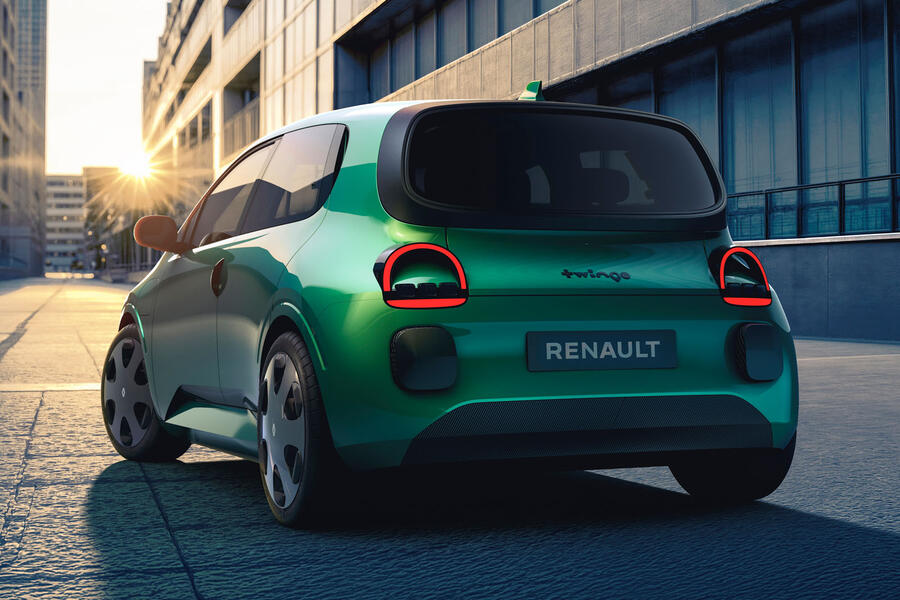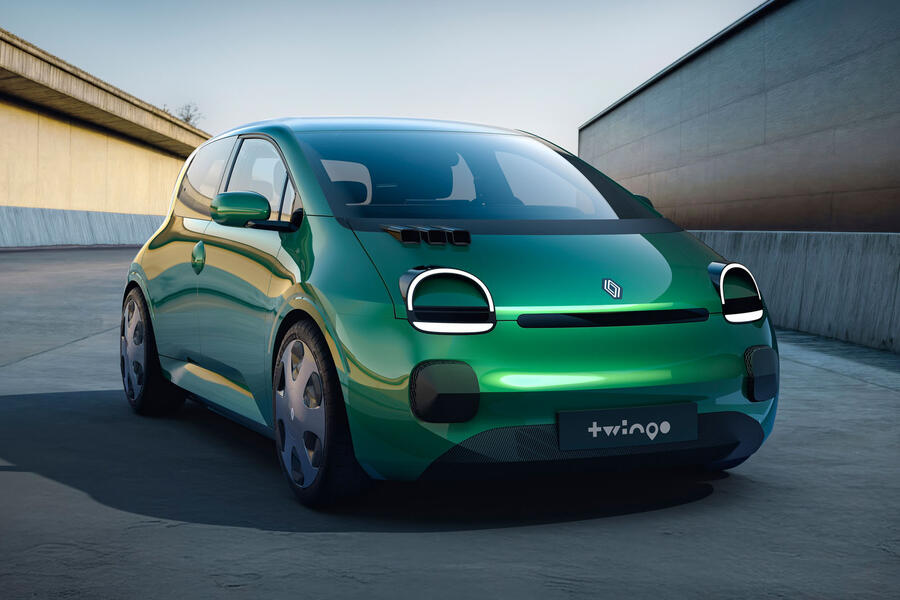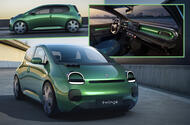This post was originally published on Autocar
New Twingo uses same platform as the reborn 5 but is 170mm shorter
French firm says there must be an organic business case for importing new electric city car
Renault is gauging the viability of launching the new Twingo in the UK but will not “force” the retro city car into the market just to boost its EV sales mix.
The fourth-generation, electric-only Twingo is due on sale next year with a starting price in Europe of sub-€20,000 (£16,700), but there is a chance that, like its 1990s namesake, it won’t be exported to the UK.
Speaking to journalists at the Brussels motor show, where a “90%-ready” prototype was unveiled (complete with running gear and a full interior), Renault bosses confirmed that internal discussions are under way on the viability of selling the Twingo here.
Product performance boss Bruno Vanel said: “There is a decision to be made. We remain on this one: a decision is still to be made, depending on the interest and the business case.”
Asked whether the Twingo could be an important addition to Renault’s ranks in the context of the UK’s zero-emission vehicle mandate, under which manufacturers must achieve a 33% EV sales mix in 2026, Renault CEO Fabrice Cambolive said: “Sure, but the main point is whether there is a customer attractiveness, demand value and whether there is a business case.
“It’s not only because of the ZEV mandate that we’re forcing a new car onto the market just to push it. We are very much focused on the value and attractiveness.”
Asked if he would push to find a way to make the Twingo work in the UK, Cambolive said: “We need to find the right balance. I love extending the line-up, I love this product and I think there can be a story in the UK; it’s just that we have to find the right figures.”
While Renault never brought the Mk1 Twingo to the UK, later iterations were sold here from 2007 to 2019, when the rear-engined Mk3 – twinned with the Smart Forfour – was taken off sale, having sold fewer than 1000 units in its final full year.
The electric Twingo ZE, which went out of production in 2024, was never offered in the UK.

Renault aims to take the Mk4 from conception to the road in less than two years and has partnered with an unnamed Chinese consultancy in a bid to make the engineering and production processes as efficient as possible.
In spite of its low projected list price (which puts it in the realm of the petrol-engined Kia Picanto and Hyundai i10) the four-seat city car features a host of “upper-segment technology” inside and is described as a “joyful, trendy” proposition.
The newly revealed interior is clearly related to that of Renault’s larger EVs, dominated as it is by a 7.0in digital instrument cluster and a 10.1in infotainment touchscreen, but makes obvious nods to the cabin of the original Twingo from 1992.
Renault describes the cockpit as “airy, cylindrical and suspended”, with ovoid air vents and surfaces an obvious homage to the era-defining 1990s supermini. Notably, the seats of this new Twingo prototype are coloured to match the exterior paint, taking inspiration from the lurid upholstery options that were available on the old car.
A more subtle nostalgic design cue is the prototype’s prominent red hazard light button, a reference to the similarly conspicuous dome-shaped button on top of the old Twingo’s dash. In another urban-flavoured 1990s throwback, the front seatbacks are adjusted using skateboard wheels.
Beyond its retro-modern design, Renault says every aspect of the Twingo’s interior is “designed to make life easier”, highlighting a range of features that boost storage capacity and utility. There are bag storage cubbies under the dashboard, for example, plus a flat, full-width shelf for books or sunglasses.
There’s also a split-folding rear bench to increase boot space, plus magnetic phone-mounts on the back of the front headrests and an elasticated bottle holder.
Beyond the interior’s retro-modern design, Renault said every aspect had been “designed to make life easier”, highlighted by a range of features that boost storage capacity and utility.

The floor of the prototype is finished in cork, chosen for its durability and resistance, but Renault noted that “show cars are an opportunity to explore and test new ideas”, so this material seems unlikely to make it into customer cars.
Externally, little has been changed from the 2023 concept, but there’s now a concealed air intake in the front bumper, the rear arches have shrunk slightly and the protective corner cladding at each end now has a honeycomb design.
In a concession to production viability, the door handles no longer light up and the semi-circular brake lights have been joined at the bottom by another LED strip.
Renault said the latest evolution of the Twingo is driveable, and while it has offered no further details on the powertrain, it’s understood to be closely related to that used in the closely related Renault 5.

The company has also yet to confirm plans to sell the Twingo in the UK, after CEO Luca de Meo told Autocar last month that developing a right-hand drive variant would be “a challenge”.
He said Renault “needed to find a business case” but acknowledged that it could be helped by its tie-up with Nissan, which will sell its next-generation Micra, another Ampr Small-based EV, with RHD in its home market of Japan.
“When they want the wheel on the other side too, it becomes less complicated,” de Meo said.

